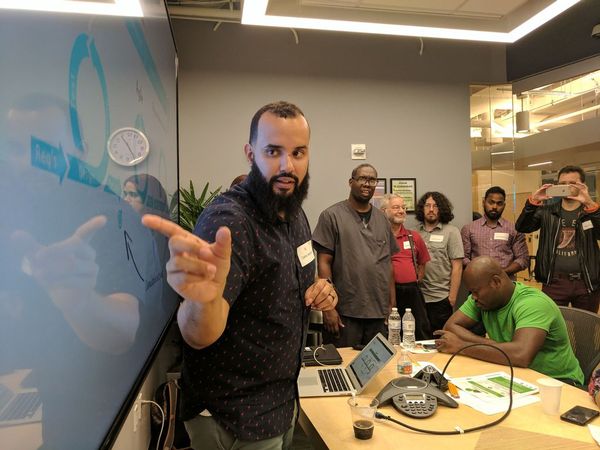

Today we’d like to introduce you to Carlos Vazquez.
Carlos, please share your story with us. How did you get to where you are today?
We can’t prepare students for the jobs of tomorrow by using yesterday’s technology. I grew up in the projects of the South Bronx with little to no access to people who could give me professional or career advice. I relied on the education system to show me the opportunities that were beyond my reality. School was the only way I could learn about the different careers that were out there and access the training necessary to qualify for them. I remember the first time I went online at a friend’s house and felt the power of the internet – the ability to connect with people all over the world and be in control over what information I digested. It was groundbreaking. I never really went back to that encyclopedia set from 1979 that my aunt gifted me in 1992. I didn’t need to. I gave in to my mother’s claims that ‘they take up too much space’ and were ‘too heavy for our flimsy bookshelf.’ When I dove into any encyclopedia, I was looking for an escape – a way to access information and empower myself with knowledge. And that is what technology has the capacity to do today – to empower our students to take control of their lives and access the jobs and opportunities that sit unfilled due to the ‘talent shortage.’ Unfortunately, our education system is antiquated and the jobs we’re preparing our students for won’t be there by the time they graduate or exit the system. That isn’t fair. We need to equip our teachers who are on the front lines with the training necessary to insert the missing puzzle pieces or arm them with the skills to design them. Students are not connected to what the world looks like today and teachers are not empowered to get them there. Neither are represented at the tables where the future of education is being designed.
Has it been a smooth road?
It hasn’t been a smooth road. Technology has evolved at such a rapid pace that it has been extremely difficult for education to keep up. Our students end up paying the price. Teachers have so much on their plate already that trying to move at the pace of technology is practically impossible. And they don’t get the ongoing support and training necessary to keep up with the changing expectations of the workplace. Innovation in an environment that is static and relies on routine and the ‘known’ is challenging.
So let’s switch gears a bit and go into the Miami EdTech story. Tell us more about the business.
The technological advancements of the 21st century have transformed entire industries, allowing them to become more efficient, more customer/user centered, and more socially responsive. In the field of education, however, the impact potential of 21st-century technology has yet to be fully realized. The problem that Miami EdTech has set out to address is two-fold. First, the impact potential of 21st-century technology has not been fully able to penetrate the field of education, due in large part to the lack of adequate teacher training. Second, the technological gains that have made their way into education have not been equitably distributed, leaving educators to find innovative “stop gap” solutions to meet students’ needs as learners. In short, Miami EdTech seeks to close the digital divide in Miami-Dade County by empowering educators to become innovation leaders as well as meaningful users of education technology.
At Miami EdTech, we seek to close the digital divide by creating a community of socially innovative educators who are champions of the impact potential of 21st-century technology in education. We accomplish this primarily through three programs: the Miami EdTech Social Innovation and Entrepreneurial Leadership (SIEL) Incubator program, the Accelerator, and the Miami EdTech EdXpert certification program. The SIEL Incubator is a six-week cohort style learning & development program designed to equip teachers with the skills necessary to identify problems and challenges within education that they would like to address or have already begun addressing. During the incubator, teachers are introduced to innovation and entrepreneurship principles. Participating in the SIEL Incubator program is designed to empower educators to become change agents for the schools and communities they serve by becoming innovation leaders and to assist them in scaling the impact of their innovation projects to other schools and communities who could benefit from them. The Accelerator focuses on companies with existing products or services and applies principles of education to the core process while providing access to a network or teachers and students who can provide feedback. The EdXpert program is a classroom-style learning and development experience that is meant to provide educators with adequate training in meaningful tech use.
How do you think the industry will change over the next decade?
We need to find better ways to leverage technology in education. Robots and other technological advancements will make it more difficult for our students to find jobs and we need to train them to flourish in that tech-enabled economy. We can only do that by mirroring closely the expectations of employers with the curriculum and learning outcomes in the classroom. Our teachers need the support to best prepare our most valuable asset – our students, for the skills needed for the 21st century.
Contact Info:
- Address: Miami EdTech
1951 NW 7th Avenue
Suite 600 Miami, FL 33136 - Website: www.miamiedtech.com
- Phone: 305 523 9407
- Email: carlos@miamiedtech.com
- Instagram: miamiedtech
- Facebook: miamiedtech
- Twitter: miamiedtech






Getting in touch: VoyageMIA is built on recommendations from the community; it’s how we uncover hidden gems, so if you know someone who deserves recognition please let us know here.

















